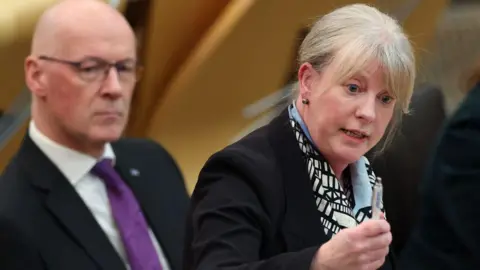National Insurance rise compensation 'disappointing'
 Getty Images
Getty ImagesThe Scottish government has said it is "deeply disappointed" by the £339m it is to receive towards the cost of increased National Insurance contributions for public sector employers this year.
The figure was confirmed by the Treasury as part of the effort to compensate the public sector for increased staffing costs due to the tax rise.
But the Scottish government said the figure fell about £360m short of what is needed because there is a larger public sector workforce here.
Finance Secretary Shona Robison said Scotland was being "punished" because more people work in the public sector north of the border.
The Treasury has said the amount reflects Scotland's share of the funds being spent across the UK.
That is calculated through the Barnett formula, which works out settlements to the devolved nations based on population.
Chancellor Rachel Reeves announced last year that the rate of employer National Insurance contributions was to increase from 13.8% to 15% in April.
The threshold at which employers have to start paying the contributions is also being lowered from £9,100 to £5,000.
However, Robison argued that the cost to the Scottish public purse would be closer to £700m.
She repeated her call for the National Insurance rise to be "abandoned," and said it risked "damaging the economy".
The Scottish government said it would provide £144m to cover 60% of the extra costs faced by councils.
Local government body Cosla said they would still be left with a £96m to cover the additional 40%.
Shona Robison said: "It is deeply disappointing that the funding confirmed today falls so far short of the more than £700m bill we estimate public services face - less than half of the cost of the National Insurance hike.
"This settlement fails to take account of the fact that we have a larger public sector per person than other parts of the UK.
"It feels like Scotland is now being punished for having decided to employ more people in the public sector and to invest in key public services."
The UK government has been contacted for comment.
